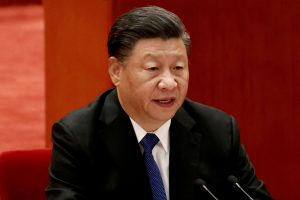
With President Muhammadu Buhari serving out his second term in 2023, one has seen a cacophony of opinions on the yardstick that should be used in picking his successor. While some are clamouring for zoning, others want a religious balance that would ensure a Christian succeeding a Muslim. A good number of people are also pushing for a youth as president.
In the midst of all these, there is a small but growing support for competence in the selection of Nigeria’s next president. Former Zamfara State Governor, Ahmed Sani; former Kano State Governor, Ibrahim Shekarau; and Kogi State Governor Yahaya Bello, have this view. They insist that zoning of political offices is a barrier to political equality.
Besides, the governors reason that since the APC constitution, as well as that of the PDP, does not expressly support the zoning of the presidency, every part of the country should be given equal opportunity to contest the 2023 presidential election.
Ahmed Sani believes that irrespective of the fact that he hails from the same Northwest as President Buhari, he should be allowed to take a shot at the nation’s highest office.
Recently in an interview, he said: “You may recall that in 2006, I declared my interest to contest for the presidency after having served Zamfara State for a period of eight years. However, I decided to withdraw from the race for the current president. Now that Mr President is completing his second term, I have decided to try again to see what God will have for me, having voluntarily decided not to go to the Senate again.
“Every politician knows what is stipulated in the constitution for anyone vying for the presidency. Besides, there is no zoning in the APC and I don’t think there is anything like a subsisting agreement”.
Yahaya Bello, the Kogi State governor stressed the fact that his party’s constitution does not recognise zoning, and firmly adds that, “the challenges facing the country have nothing to do with where the president comes from, as Nigerians are looking for young, vibrant, and responsible leaders, who can tackle the challenges facing the country”.
Although not written, it has been the political culture in Nigeria that key political offices at the federal and state levels, particularly the presidency and governorship positions, are rotated among the various ethnic groups or zones.
Among all the political offices in the country, the presidency attracts more attention as the occupant has enormous power in resource allocation, appointment, and distribution of infrastructure.
Last year, a northern elite, Mamman Daura had an interview with the BBC that got unprecedented attention because he said the next election cycle for the office of the president should not be based on zoning but competence.
Although his comments were not well received in various quarters where they believe it is time for certain tribes to occupy the centre, Daura who also happens to be the nephew of the current President, said the zoning formula which had been adopted since 1999 in the election of the country’s leader, has failed.
This assertion by the elder statesman was considered the popular opinion within Nigeria’s political landscape, especially in the North, as most people believe using ethnicity to determine leadership positions limits the wealth of their choices.
However, some Nigerians believed that the call for competence over zoning by Mamman Daura could have been easier for him because the current president comes from his part of the country and therefore declaring it free to all gives them a better chance to have another go.
Similarly, President of the Arewa Youth Consultative Forum (AYCF), Alhaji Yerima Shetima observed that there has been agitation for the zoning of the Presidency to the South after the expiration of the tenure of President Muhammadu Buhari
His words: “Some of us have a belief that this is about the country where we all have a stake. But we are also saying that those days are over where any political party or any individual or group of people will just sit down on their own and bring about what is called, ‘a gentleman agreement’ into the fold.
“We are more concerned about competency in the country. It could come from the South-East, South-South, South-West or anywhere, we are looking at competency, not zonal arrangement. It is not constitutional and it can’t be binding on anybody. It cannot survive the test of time certainly. We are going to look at competency when the time comes.”
Interestingly, politicians of southern extraction are the ones holding onto the strong view that it is their turn to produce the next president. Recently, some leaders of the Southeast, including the Senate chief whip, Orji Uzor Kalu, former deputy Senate President, Senator Ike Ekweremadu, among others, had at a meeting in Igbere, Abia State, asked the APC and PDP to zone their presidential tickets to the Southeast in the interest of fairness.
Political gladiators from the Southwest are not left out of the agitation for zoning the presidential office to the Southwest. The Minister of Works and Housing, Babatunde Raji Fashola at a time said the agreement during the merger for the All Progressive Congress, though not written, was for the slot to be given to the Southwest in 2023.
The major opposition political party in the country, PDP, is also caught in the web of zoning the ticket for its presidential flag bearer in 2023. To the amazement of many, it is almost certain that the party is going to zone its presidential ticket to the North. Though it is too early to draw a conclusion on that position, the development is already generating a lot of concern in the polity.
While the party has argued it wants to have a level playing field for all regions of the country, there are those who feel this new stance has thrown a lot of presidential ambitions into the mud.
Read Also: 2023: The Challenges of Nigeria’s Leadership Deficit
Some concerned citizens have warned that equity should not be sacrificed on the altar of parochialism since it was the rotation sentiment that produced the present incumbent president, Muhammadu Buhari.
Some analysts still insist on their views that Nigerians should not even look at religion, ethnicity, or any other sentiment come 2023 but competence alone. For them, Nigerians should believe in a good president for Nigeria irrespective of tribe or religion.
However, there are still some schools of thought who believe zoning and competence can co-exist. The belief is that the two have benefits that can enhance national development. In a nation where population is not evenly distributed, zoning could be the only way minority groups can have a sense of inclusion in the polity. Even with this, there should be a yardstick or minimum condition anyone contesting should meet.
With this, every zone would be compelled to bring their first-team players to the field. Whether a leader came in through zoning or competence or a combination of the two, any focused, sincere and dedicated leader will make an impact in the lives of the citizenry within the tenure of his or her leadership.

